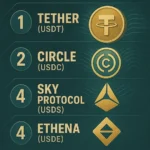Kazakhstan is putting crypto to the ultimate real-world test. The country is moving quickly forward with plans for “CryptoCity,” a dedicated pilot zone intended to seamlessly integrate cryptocurrencies into the fabric of daily economic life, in response to President Kassym-Jomart Tokayev’s historic announcement made at the Astana International Forum (AIF) just days ago. This ambitious move marks a significant leap from mining hub to full-scale blockchain adoption laboratory. The president, addressing a packed hall of global leaders, diplomats, and institutional heavyweights on May 29th, unveiled his vision to create the first-ever CryptoCity.
“We are planning to create a pioneering pilot zone called CryptoCity where cryptocurrencies might be used for purchasing goods, services, and even beyond.”
– President Kassym-Jomart Tokayev
This isn’t just about buying coffee with Bitcoin; it signals a comprehensive trial of blockchain technology for routine transactions, potentially encompassing utilities, local services, and retail on an unprecedented scale for a sovereign nation. The initiative is a cornerstone of Kazakhstan’s aggressive strategy to diversify its economy through tech innovation and position itself as Eurasia’s digital frontrunner.
The CryptoCity concept is the logical next step, recalling Kazakhstan’s rapid ascent as a global Bitcoin mining powerhouse following the 2021 Chinese mining exodus. They’ve built the infrastructure and regulatory scaffolding for mining. They’re stress-testing crypto’s utility for the average citizen and business. If successful, it provides a desperately needed blueprint for real-world adoption beyond speculative trading and niche use cases.
A declaration of intent, the pilot zone is more than just a technical demonstration. “At the AIF, we are making significant progress in digital transformation, reflecting our desire to become an IT hub in Eurasia,” Tokayev stressed. CryptoCity exemplifies this motivation, coexisting with national initiatives in advanced manufacturing, clean energy, and artificial intelligence. Crucially, it suggests a potential maturation of Kazakhstan’s regulatory approach, moving beyond mining oversight to actively fostering a transactional crypto ecosystem under controlled conditions.
Envision a sovereign state with significant existing crypto infrastructure deliberately creating a sandbox where digital assets function as actual currency for daily needs. This is precisely the kind of validation the broader crypto market needs. Success here could catalyze similar pilots globally, particularly in emerging economies seeking a financial innovation leapfrog. It pressures legacy financial systems to accelerate their digital asset integrations. Crypto traders should watch the regulatory details emerging from the CryptoCity, as they’ll be a bellwether for institutional confidence.
While specifics on location, participating cryptocurrencies, and exact launch timing are still under wraps, the announcement alone sends ripples through the crypto sphere. Kazakhstan isn’t just talking about blockchain’s potential; it’s building a city-sized testbed. As Kazakhstan integrates blockchain with daily life, it surely will transition aspirations to a tangible experiment.
The world, especially Eurasia, will be watching Cryptocity intensely. If it thrives, it could redefine how nations view the practical utility of cryptocurrencies, proving that blockchain’s promise can extend far beyond trading charts and into the very rhythm of daily commerce. The grand experiment begins soon.















